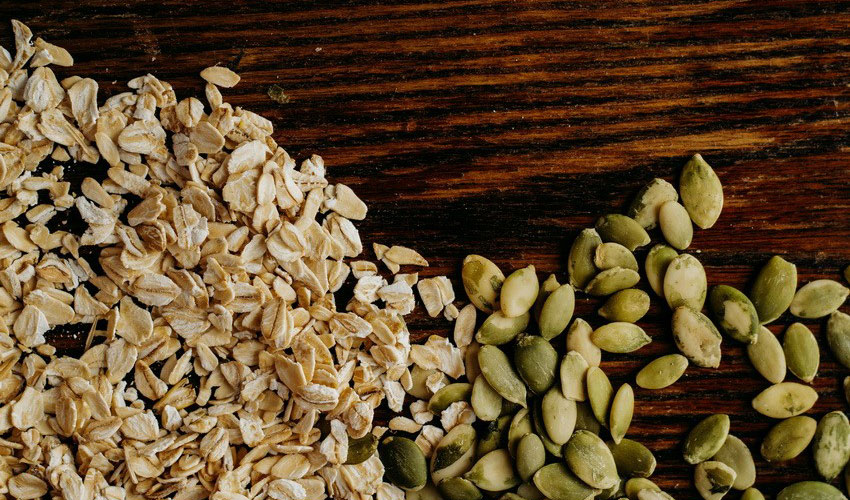Why Health Experts Advocate for Beta Glucan - Based on 214,000 Studies
Lately, I've been seeing Beta Glucans popping up all over natural health websites. Intrigued but admittedly clueless about what they actually are, I decided to delve deeper into this mysterious compound that seems to be all the rage in the world of holistic healing. What I unearthed was nothing short of fascinating. Beta Glucans, a powerhouse of bioactive substances, are generating quite the buzz for their wide array of health-enhancing and prebiotic benefits. These complex molecules have been shown to possess an impressive range of biological effects, from bolstering the immune system and reducing inflammation to combatting cancer, ageing, and regulating blood sugar and cholesterol levels.
It's no wonder that Beta Glucans are gaining traction as a key player in the natural health world. With such a versatile and potent profile, it's clear why more and more people are turning to these miraculous compounds for a natural way to enhance their overall well-being. Let’s dig deeper! Beta-Glucans are a type of polysaccharide made up of D-glucose monomers linked together by β-glycosidic bonds. These compounds, known for their ability to enhance health, are a form of dietary fibre found in a variety of natural sources such as barley, oats, yeast, seaweed, mushrooms, bacteria, and algae…

Beta-Glucans & Gut Health
In recent years, there has been a growing interest in the role of Beta-Glucans in promoting gut health. I’ve already mentioned at the start of this article, Beta-Glucans are a type of soluble fibre found in various foods such as oats, barley, seaweeds, mushrooms, and yeast. They have been shown to have a wide range of health benefits, including supporting a healthy immune system, reducing inflammation, and promoting digestive health. One of the key ways in which Beta-Glucans support gut health is by acting as a prebiotic. Prebiotics are non-digestible fibres that serve as food for the beneficial bacteria in the gut, known as probiotics. By providing a food source for these beneficial bacteria, Beta-Glucans help to promote the growth of a healthy and diverse gut microbiome. A healthy gut microbiome is essential for overall health and well-being. The gut microbiome plays a crucial role in digestion, nutrient absorption, immune function, and even mental health. An imbalance in the gut microbiome, known as dysbiosis, has been linked to a wide range of health issues, including inflammatory bowel diseases, obesity, and even neurological disorders.
Research has shown that Beta-Glucans can help to promote a healthy gut microbiome by increasing the growth of beneficial bacteria such as Lactobacillus and Bifidobacterium. These bacteria play a key role in maintaining a healthy gut environment and preventing the growth of harmful bacteria. In addition to promoting the growth of beneficial bacteria, Beta-Glucans also have anti-inflammatory properties that can help to reduce inflammation in the gut. Chronic inflammation in the gut has been connected to numerous health issues, including inflammatory bowel diseases, irritable bowel syndrome, and even certain types of cancer. By reducing inflammation, Beta-Glucans can help to promote a healthy gut environment and reduce the risk of developing these conditions. In conclusion, Beta-Glucans are a powerful tool for promoting gut health and supporting overall well-being. By acting as a prebiotic, reducing inflammation, and supporting immune function, Beta-Glucans can help to promote a healthy gut microbiome and protect against a wide range of health issues.
Beta-Glucans & Cancer
Beta-Glucans have gained significant attention in recent years due to their potential health benefits, particularly in relation to cancer prevention and treatment. Numerous studies have shown that Beta-Glucans have immune-boosting properties that can help to prevent cancer by enhancing the body's natural defense mechanisms. When consumed, Beta-Glucans activate certain immune cells called macrophages, which play a key role in attacking and destroying cancer cells. In addition, Beta-Blucans have been shown to stimulate the production of cytokines, which are proteins that help regulate the immune response and have anti-cancer effects. Furthermore, these compounds have been found to have direct anti-cancer effects by inhibiting the growth and spread of cancer cells. Some studies have shown that Beta-Glucans can induce apoptosis, or programmed cell death, in cancer cells, making them a potential tool for cancer treatment. In addition, Beta-Glucans have been shown to inhibit angiogenesis, the process by which tumors develop new blood vessels to fuel their growth, further restricting the tumor's ability to thrive.
Research on Beta-Glucans and cancer is still ongoing, but the results so far have been promising. In one study, researchers found that Beta-Glucans were able to enhance the effectiveness of chemotherapy in treating lung cancer, suggesting that they may have a role to play in combination with conventional cancer treatments. Other studies have shown that Beta-Glucans can help to reduce the side effects of cancer treatments such as chemotherapy and radiation therapy, making them a valuable addition to cancer care. While more research is needed to fully understand the role of Beta-Glucans in cancer prevention and treatment, the current evidence suggests that these compounds may hold great promise in the fight against cancer. Incorporating Beta-Glucan-rich foods into your diet, such as oats, barley, and mushrooms, may help to support your immune system and reduce your risk of developing cancer.

Beta-Glucans & Diabetes
Diabetes is a chronic condition characterised by high blood glucose levels, either due to the body's inability to produce enough insulin (Type 1 diabetes) or the body's inability to use insulin effectively (Type 2 diabetes). Managing blood glucose levels is crucial for people with diabetes to prevent complications such as heart disease, kidney damage, and nerve damage. Research has revealed that Beta-Glucans may play a role in managing blood glucose levels and improving insulin sensitivity in people with diabetes. One of the ways in which Beta-Glucans may benefit those with diabetes is by slowing down the absorption of carbohydrates in the gut. This can help prevent spikes in blood glucose levels after meals, which is particularly important for individuals with Type 2 diabetes. In addition, Beta-Glucans have been shown to improve insulin sensitivity, which is the body's ability to respond to and utilise insulin effectively. Insulin sensitivity is often impaired in persons with Type 2 diabetes, leading to elevated blood glucose levels. By improving insulin sensitivity, Beta-Glucans may help individuals with diabetes better regulate their blood glucose levels.
In addition to their effects on blood glucose levels, beta-glucans have also been shown to have anti-inflammatory and antioxidant properties. Chronic inflammation and oxidative stress are common in individuals with diabetes and are associated with an increased risk of complications. By reducing inflammation and oxidative stress, beta-glucans may help protect against complications such as cardiovascular disease and kidney damage in individuals with diabetes. Several scientific studies have demonstrated the potential benefits of Beta-Glucans for people with diabetes. For example, a study published in the Journal of Nutrition found that supplementing with Beta-Glucans from oats significantly improved blood glucose levels and insulin sensitivity in individuals with Type 2 diabetes. Another study published in the International Journal of Molecular Sciences showed that Beta-Glucans from mushrooms may help reduce inflammation and improve insulin sensitivity in individuals with diabetes.
While the research on Beta-Glucans and diabetes is promising, more studies are needed to fully understand the mechanisms behind their benefits and the most effective dosages for diabetes management. It is important for individuals with diabetes to consult with a healthcare provider before incorporating Geta-Glucans into their treatment regimen, as they may interact with certain medications or have adverse effects in some persons. In summary, Beta-Glucans are a promising natural compound that may help people with diabetes manage their blood glucose levels and improve insulin sensitivity. Further research is needed to fully understand the potential of Beta-Glucans for diabetes management, but the current evidence suggests that they may be a valuable addition to the treatment plan for diabetes sufferers.

Beta-Glucans & Anti-Ageing
Ageing is a natural process that affects everyone, but with advances in science and nutrition, there are ways to slow down the signs of ageing and promote healthier, more youthful skin. One key ingredient that has been gaining attention for its anti-ageing properties is Beta-Glucans. Research has shown that Beta-Glucans have antioxidant and anti-inflammatory properties, which can help protect the skin from damage caused by free radicals and environmental stressors. Free radicals are unstable molecules that can damage cells and lead to premature ageing, while inflammation is a key factor in the ageing process. By reducing oxidative stress and inflammation, Beta-Glucans can help to prevent the breakdown of collagen and elastin in the skin, which are essential proteins that give skin its firmness and elasticity. This can help to reduce the appearance of fine lines and wrinkles, as well as improve the overall texture and tone of the skin. In addition to their anti-inflammatory and antioxidant properties, Beta-Glucans have been shown to stimulate collagen production and promote cell turnover, which can help to plump up the skin and reduce the appearance of age-related skin concerns. This can result in smoother, firmer, and more youthful-looking skin.
Furthermore, Beta-Glucans have been found to enhance the skin's natural barrier function, helping to retain moisture and protect against environmental aggressors. This can help to improve the skin's overall hydration levels and support a healthy complexion. Incorporating Beta-Glucans into your skincare routine can help to improve the overall health and appearance of your skin, leading to a more radiant and youthful complexion. They can be found in a variety of skincare products, including serums, moisturisers, and masks, as well as in food supplements and foods. In a nutshell, Beta-Glucans are a powerful ingredient that can help to combat the signs of ageing and promote healthier, more youthful skin. Their antioxidant, anti-inflammatory, and collagen-boosting properties make them a valuable addition to any anti-ageing skincare routine.
Beta-Glucans & Immune System Health
Numerous natural health practitioners are convinced that Beta Glucans is the #1 immune-bolstering ingredient on the planet! They have been studied extensively for their potential benefits in supporting immune system health. One of the main ways that Beta-Glucans are thought to support immune system health is by activating the innate immune system. The innate immune system is our body's first line of defence against foreign pathogens, and Beta-Glucans have been shown to stimulate the activity of immune cells such as macrophages, neutrophils, and natural killer cells. These immune cells play a crucial role in recognising and eliminating pathogens, helping to protect the body from infection. In addition, Beta-Glucans have been shown to have anti-inflammatory properties, which can help to reduce inflammation in the body and support overall immune system health. Chronic inflammation has been linked to a variety of health problems, including autoimmune diseases, cardiovascular disease, and cancer. By reducing inflammation, Beta-Glucans may help to support the body's overall immune function.
Beta-Glucans have also been studied for their potential role in supporting the immune response to vaccines. Some research suggests that Beta-Glucans may help to enhance the immune response to vaccines by activating immune cells and increasing the production of antibodies. This could potentially improve the effectiveness of vaccines and help to better protect people from infectious diseases. Also, Beta-Glucans have been shown to have antioxidant properties, which can help to protect cells from damage caused by free radicals. Free radicals are unstable molecules that can cause cell damage and contribute to a variety of health problems, including cancer, heart disease, and aging. By neutralising free radicals, Beta-Glucans may help to support overall immune system health and reduce the risk of chronic diseases. Overall, the research on beta-glucans and immune system health is very promising, and many health experts believe that including Beta-Glucans in your diet or as a food supplement may help to support immune function and overall health.

Beta Glucans & Cholesterol Health
Beta-Glucans have also been found to have a positive effect on cholesterol levels. High cholesterol is a major risk factor for heart disease, the leading cause of death worldwide. Beta-Glucans can help lower cholesterol by binding to bile acids in the gut and preventing them from being reabsorbed into the bloodstream. This forces the liver to use up more cholesterol to make new bile acids, ultimately reducing circulating cholesterol levels. Mushrooms like shiitake and reishi contain Beta-Glucans and can be enjoyed in various dishes or taken as a food supplement. Ancient Purity supplies Natural Full Spectrum Reishi Mushroom Powder.
Beta Glucans & Cholesterol Health
In the pursuit of a healthy weight and overall wellness, incorporating Beta-Glucans into your diet may prove to be a valuable strategy. Let's delve deeper into the science behind how Beta-Glucans can support your weight loss journey. Beta-Glucans are polysaccharides composed of glucose molecules arranged in a specific structure that gives them their health-promoting properties. They are known for their ability to form a viscous gel in the digestive tract, which helps slow down digestion and promote feelings of fullness and satiety. This mechanism can ultimately lead to reduced calorie intake and better appetite control, both of which are crucial factors in achieving and maintaining a healthy weight. One of the key ways in which Beta-Glucans aid in weight management is by influencing energy metabolism. Studies have shown that Beta-Glucans can help regulate blood sugar levels and improve insulin sensitivity, which are important factors in controlling appetite and preventing overeating. By promoting more stable blood sugar levels, Beta-Glucans can also help prevent spikes and crashes in energy levels, reducing cravings for unhealthy foods and supporting better food choices.
Another way in which Beta-Glucans contribute to weight management is through their beneficial effects on gut health. These fibres act as prebiotics, serving as food for beneficial gut bacteria and promoting a healthy gut microbiome. A balanced and diverse gut microbiota has been associated with improved metabolism, reduced inflammation, and better weight regulation. By nourishing the gut microbiota, Beta-Glucans can support overall digestive health and potentially aid in weight loss efforts. When consumed, Beta-Glucans form a gel-like substance in the stomach, which slows down the emptying of the stomach and the absorption of nutrients. This prolonged gastric transit time creates a sense of fullness that can help curb hunger and reduce overall caloric intake. By making you feel fuller for longer periods of time, Beta-Glucans can support portion control and ultimately contribute to weight loss or maintenance.
Beta Glucans & Blood Pressure Health
Blood pressure plays a crucial role in our overall health and well-being, with high blood pressure (hypertension) being a major risk factor for cardiovascular disease. While lifestyle changes such as diet and exercise are key components in managing blood pressure, emerging research suggests that incorporating Beta-Glucans into your daily routine may offer additional benefits. In this section, we explore the relationship between Beta-glucans and blood pressure health, shedding light on how these potent fibres can support cardiovascular wellness. When it comes to blood pressure health, Beta-Glucans exert their effects through multiple mechanisms, including their impact on inflammation, oxidative stress, and vascular function. The ability of blood vessels to dilate and constrict plays a critical role in regulating blood pressure. Beta-Glucans have been shown to promote vasodilation, or the widening of blood vessels, which can lead to improved blood flow and lower blood pressure. By enhancing endothelial function and supporting vascular health, Beta-Glucans may help maintain optimal blood pressure levels and reduce the risk of hypertension. Several studies have investigated the effects of Beta-Glucans on blood pressure and cardiovascular health, with promising results. For example, a meta-analysis published in the journal Nutrition Reviews found that Beta-Glucan consumption was associated with significant reductions in both systolic and diastolic blood pressure. While more research is needed to fully elucidate the mechanisms underlying these effects, current evidence suggests that Beta-Glucans can be a valuable addition to a comprehensive approach to blood pressure management.
Beta Glucans & Brain Health
The brain is the command centre of our body, responsible for cognitive functions, emotions, and overall well-being. As we age, maintaining brain health becomes increasingly important to support cognitive function and prevent neurodegenerative diseases. Emerging research suggests that Beta-Glucans, powerful fibres found in certain foods, may play a vital role in promoting brain health. In this section, we delve into the relationship between Beta-Glucans and brain health, shedding light on how these compounds can support cognitive function and protect against cognitive decline. Research indicates that Beta-Glucans possess neuroprotective properties that can help safeguard the brain against damage and degeneration. These compounds have been shown to reduce oxidative stress, combat inflammation, and enhance the brain's defence mechanisms, thereby promoting neuronal health and resilience. By protecting against neurotoxicity and supporting neuronal function, Beta-Glucans have the potential to mitigate the risk of cognitive impairment and neurodegenerative diseases.
The gut-brain axis, a bidirectional communication system connecting the gut microbiota to the brain, plays a significant role in brain health and cognitive function. Beta-Glucans have been demonstrated to influence the gut microbiota composition and function, promoting the growth of beneficial bacteria and enhancing gut barrier integrity. Through their interactions with the gut microbiota, Beta-Glucans can exert positive effects on brain function, mood regulation, and cognitive performance. Studies suggest that Beta-Glucans may have a direct impact on cognitive function and memory. These fibres can modulate neurotransmitter levels, improve neuronal signaling, and enhance synaptic plasticity, all of which are essential for learning and memory processes. By supporting brain connectivity and neural communication, Beta-Glucans have the potential to enhance cognitive performance and preserve cognitive function throughout life. While further research is needed to fully elucidate the mechanisms underlying the effects of Beta-Glucans on brain health, preliminary studies have shown promising results. For example, a study published in the Journal of Alzheimer's Disease reported that supplementation with Beta-Glucans improved cognitive function and reduced neuroinflammation in mice with Alzheimer's disease. These findings underscore the potential of Beta-Blucans as a valuable dietary component for brain health. Remember that a healthy brain is essential for a fulfilling life, and Beta-Glucans can serve as a key ingredient in your recipe for brain health and resilience.

Beta-Glucans & Metabolism
Beta-Glucans represent a powerful component of dietary fibre with profound implications for metabolism and overall health. Their multifaceted effects on cholesterol reduction, glycemic control, satiety, gut health, and inflammation make them a valuable addition to any diet. As ongoing research continues to uncover the full extent of their benefits, Beta-Glucans may play an increasingly pivotal role in managing metabolic disorders and promoting long-term health. By embracing foods rich in Beta-Glucans, people can take proactive steps toward enhancing their metabolic health and overall well-being.
Beta-Glucans & Bone Health
Clinical trials have revealed that Beta Glucan exhibits promising anti-osteoporotic properties. However, further research is essential to fully understand its effects on humans. Osteoporotic fractures arise in persons with osteoporosis, a condition characterised by fragile bones resulting from low bone mass and deterioration. In addition to its potential benefits for bone health, Beta Glucans have been shown to mobilise progenitor cells from bone marrow in mice, promoting effective recovery of hematopoietic function after bone marrow injury. This dual action highlights the need for more comprehensive studies to explore the full therapeutic potential of Beta Blucans in human health.
“Regardless of the issues with defining and measuring dietary fiber, if you examine the Nutrition Facts Labels of many packaged foods, you will find that dietary fiber is lacking in much of what we normally eat. Packaged foods made with refined flour and copious amounts of added sugars provide no sustenance for the microbiota and likely translate into guts populated by starving microbes.” - Justin Sonnenburg
References
- [CITATION] Immunostimulating properties of two different β-glucans isolated from Maitake mushroom (Grifola frondosa) V Vetvicka, J Vetvickova - JANA, 2005
- N.N. Abbasi et al. Oat β-glucan depresses SGLT1- and GLUT2-mediated glucose transport in intestinal epithelial cells (IEC-6) Nutrition Research (2016)
- J. Hallfrisch et al. Diets containing soluble oat extracts improve glucose and insülin responses of moderately hypercholesterolemic men and women. American Journal of Clinical Nutrition (1995)
- M.M. Kaczmarczyk et al. The health benefits of dietary fiber: Beyond the usual suspects of type 2 diabetes, cardiovascular disease and colon cancer. Metabolism (2012)
- Vetvicka V, Vetvickova J: Comparison of immunological effects of commercially available β-glucans Appl Sci Rep 1: 1-7, 2014.
- Shear MJ, Turner FC, Perrault A, Shovelton T: Chemical treatment of tumors. V. Isolation of the hemorrhage–producing fraction from serratia marcescens (bacillus prodigiosus) culture filtrate. J Natl Cancer Inst 4(1): 81-97, 1943.
- de Oliveira Silva V, Oliveira de Moura N, Rodrigues de Oliveira LJ, Peconick AP, Pereira LJ: Promising effects of beta-glucans on metabolism and on the immune responses: Review article. Am J Immunol 13(1): 62-72, 2017.
- Q. Wang et al. β-Glucans: Relationships between Modification, Conformation and Functional Activities. Molecules (2017)
- Vannucci L, Krizan J, Sima P, Stakheev D, Caja F, Rajsiglova L, Horak V, Saieh M: Immunostimulatory properties and antitumor activities of glucans (review). Int J Oncol 43(2): 357-364, 2013
- Vannucci L, Sima P, Vetvicka V, Krizan J: Lentinan properties in anticancer therapy: A review on the last 12-year literature. Am J Immunol 13(1): 50-61, 2017.
- Vetvicka V, Vetvickova J: Glucan supplementation has strong anti-melanoma effects: Role of NK cells. Anticancer Res 35(10): 5287-5292, 2015.
- Bremer JM, Scott RS, Lintott CJ. Oat bran and cholesterol reduction: evidence against specific effect. Australian and New Zealand Journal of Medicine. 1991;21(4):422–426. doi: 10.1111/j.1445-5994.1991.tb01345.x. [DOI] [PubMed]
- Kestin M, Moss R, Clifton PM, Nestel PJ. Comparative effects of three cereal brans on plasma lipids, blood pressure, and glucose metabolism in mildly hypercholesterolemic men. American Journal of Clinical Nutrition. 1990;52(4):661–666. doi: 10.1093/ajcn/52.4.661. [DOI] [PubMed]
- Shomori K, Yamamoto M, Arifuku I, Teramachi K, Ito H: Antitumor effects of a water-soluble extract from maitake (grifola frondosa) on human gastric cancer cell lines. Oncol Rep 22(3): 615-620, 2009. PubMed
- Demir G, Klein HO, Mandel-Molinas N, Tuzuner N: Beta glucan induces proliferation and activation of monocytes in peripheral blood of patients with advanced breast cancer. Int Immunopharmacol 7(1): 113-116, 2007. CrossRefPubMed
- C. Chen et al. Effect of β-glucan on metabolic diseases: a review from the gut microbiota perspective. Curr. Opin. Food Sci. (2022)
- J. Bai et al. Physiological functionalities and mechanisms of β-glucans. Trends Food Sci. Technol. (2019)






















